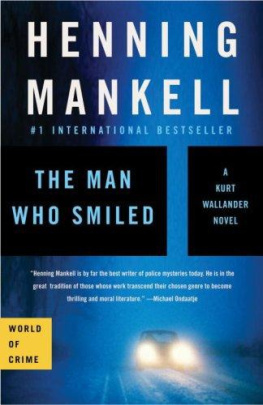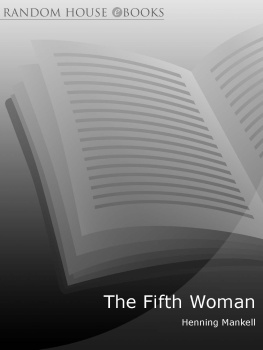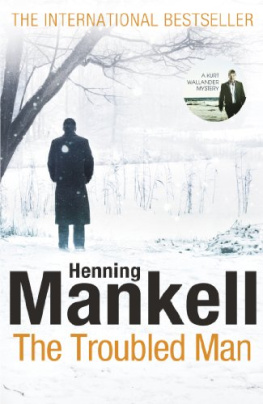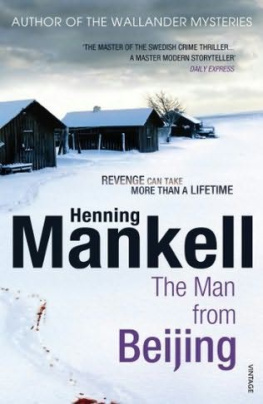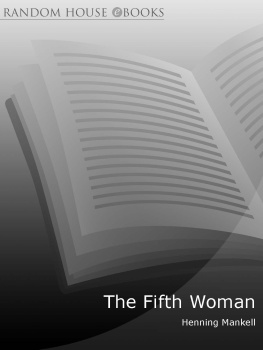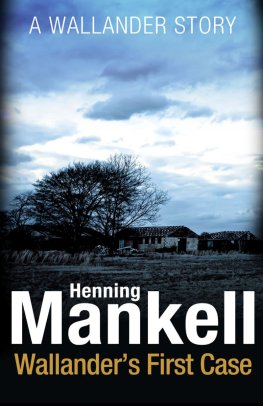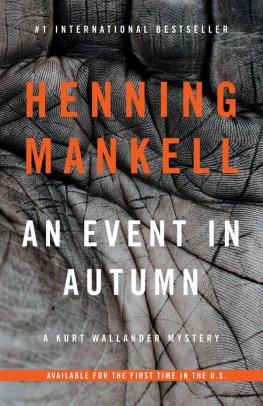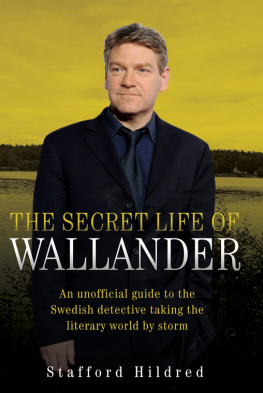H enning Mankell
THE MAN WHO SMILED
Translated from the Swedish by Laurie Thompson
THE HARVILL PRESS LONDON
Published by The Harvill Press, 2005
2468 97531
Copyright Henning Mankell, 1994 English translation copyright Laurie Thompson, 2005
Henning Mankell has asserted his right under the Copyright, Designs and Patents Act 1988 to be identified as the author of this work
This book is sold subject to the condition that it shall not, by way of trade or otherwise, be lent, resold, hired out, or otherwise circulated without the publisher's prior consent in any form of binding or cover other than that in which it is published and without a similar condition including this condition being imposed on the subsequent purchaser
First published with the title Mannen son log by Ordfronts Forlag, Stockholm, 1994
First published in Great Britain in 2005 by The Harvill Press Random House Vauxhall Bridge Road London swiv 2SA
Random House Australia (Pty) Limited Alfred Street, Milsons Point, Sydney, New South Wales 2061, Australia
Random House New Zealand Limited Poland Road, Glenfield, Auckland 10, New Zealand
Random House South Africa (Pty) Limited Endulini, 5A Jubilee Road, Parktown 2193, South Africa
The Random House Group Limited Reg. No. 954009
A CIP catalogue record for this book is available from the British Library
ISBN 1 84343 098 3 (hardback) ISBN 1 84343 106 8 (paperback)
Papers used by Random House are natural, recyclable products made from wood grown in sustainable forests; the manufacturing processes conform to the environmental regulations of the country of origin
Typeset in Minion by Palimpsest Book Production Limited Printed and bound in Great Britain by Clays Ltd, St Ives pl c
It is not so much the sight of immorality of the great that is to be feared as that of immorality leading to greatness.
ALEXIS DE TOCQUEVILLE
Democracy in America
CHAPTER
Fog.
A silent, stealthy beast of prey. Even though I have lived all my life in Skne , where fog is forever closing in and shutting out the world, I'll never get used to it.
9 p.m., October 11,1993.
Fog came rolling in from the sea. He was driving home to Ystad and had just passed Br sarp Hills when he found himself in the thick of the white mass.
Fear overcame him straight away.
I'm frightened of fog, he thought. I ought rather to be scared of the man I have just been to see at Farnholm Castle. The friendly man whose menacing staff always lurk in the background, their faces in the shadows. I ought to be thinking about him and what I now know is hidden behind that friendly smile. His impeccable standing in the community, above the very least suspicion. He is the one I ought to be frightened of, not the fog drifting in from Han Bay. Not now that I have discovered that he would not hesitate to kill anyone who gets in his way.
He turned on the wipers to try to clear the windscreen. He did not like driving in the dark. He particularly disliked it when rabbits scurried this way and that in the headlights.
Once, more than 30 years ago, he had run over a hare. It was on the Tomelilla road, one evening in early spring. He could still remember stamping his foot down on the brake pedal, but then a dull thud against the bodywork. He had stopped and got out. The hare was lying on the road, its back legs kicking. The upper part of its body was paralysed, but its eyes stared at him. He had had to force himself to find a heavy stone from the verge, and had shut his eyes as he threw it down on to the hare's head. He had hurried back to the car without looking again at the animal.
He had never forgotten those eyes and those wildly kicking legs. The memory kept coming back, again and again, usually at the most unexpected times.
He tried now to put the unpleasantness behind him. A hare that died all of 30 years ago can haunt a man, but it can't harm him, he thought. I have more than enough worries about people still in the land of the living.
He noticed that he was checking his rear-view mirror more often than usual.
I'm frightened, he thought again, and I have only just realised that I am running away. I am running from what I know is hidden behind the walls of Farnholm Castle. And they know that I know. But how much? Enough for them to be afraid that I'll break the oath of silence I once took as a newly qualified solicitor? A long time ago that was, when an oath was just that: a sacred commitment to professional secrecy. Are they nervous about their old lawyer's conscience?
Nothing in the rear-view mirror. He was alone in the fog, but in under an hour he would be back in Ystad.
The thought cheered him, if only for a moment. So they weren't following him after all. He had made up his mind what he was going to do tomorrow. He would talk to his son, who was also his colleague and a partner in the legal practice. There was always a solution, that was something life had taught him. There had to be one this time too.
He groped on the unlit dashboard for the radio. The car filled with a man's voice talking about the latest research in genetics. Words passed through his brain without his taking them in. He checked his watch: nearly 9.30. Still no-one behind him, but the fog seemed to be getting even thicker. Nevertheless, he squeezed the accelerator a little harder. The further he was from Farnholm Castle, the calmer he felt. Perhaps, after all, he had nothing to fear.
He forced himself to think clearly.
It had begun with a perfectly ordinary telephone call, a message on his desk asking him to contact a man about a contract that urgently needed verifying. He did not recognise the name, but had taken the initiative and made the call: a small solicitors' practice in an insignificant Swedish town could not afford to reject a potential client. He could recall even now the voice on the phone: polite, with a northern accent, but at the same time giving the impression of a man who measured out his life in terms of what each minute cost. He had explained the task, a complicated transaction involving a shipping line registered in Corsica and a number of cement cargoes to Saudi Arabia, where one of his companies was acting as an agent for Skanska. There had been some vague, passing reference to an enormous mosque that was to be built in Khamis Mushayt. Or maybe it was a university building in Jeddah.
They had met a few days later at the Continental Hotel in Ystad. He had got there early, and the restaurant was not yet open for lunch; he had sat at a table in the corner and watched the man arrive. The only other person there was a Yugoslav waiter staring gloomily out of the window. It was the middle of January, a gale was blowing in from the Baltic and it would soon be snowing. But the man approaching him was suntanned. He wore a dark blue suit and was definitely no more than 50. Somehow, he did not belong either in Ystad or in the January weather. He was a stranger, with a smile that did not belong to that suntanned face.
That was the first time he had set eyes on the man from Farnholm Castle. A man without baggage, in a discrete world of his own, in a blue, tailor-made suit, everything centring on a smile, and an alarming pair of shadowy satellites buzzing attentively but in the background.
Oh yes, the shadows had been there even then. He could not recall either of them being introduced. They sat at a table on the other side of the room, and rose without a word when their master's meeting was over.
Golden days, he thought, bitterly, and I was stupid enough to believe in it. A solicitor's vision of the world should not be influenced by the illusion of a paradise to come, not here on earth at least. Within six months the suntanned man had come to be responsible for half of the practice's turnover, and in a year the firm's income had doubled. Bills were paid promptly, it was never necessary to send a reminder. They had been able to afford to redecorate their offices. The man at Farnholm Castle seemed to be managing his business in every corner of the world, and from places that seemed to be chosen more or less at random.
Next page
